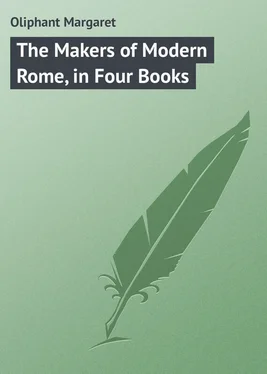Margaret Oliphant - The Makers of Modern Rome, in Four Books
Здесь есть возможность читать онлайн «Margaret Oliphant - The Makers of Modern Rome, in Four Books» — ознакомительный отрывок электронной книги совершенно бесплатно, а после прочтения отрывка купить полную версию. В некоторых случаях можно слушать аудио, скачать через торрент в формате fb2 и присутствует краткое содержание. Жанр: foreign_prose, на английском языке. Описание произведения, (предисловие) а так же отзывы посетителей доступны на портале библиотеки ЛибКат.
- Название:The Makers of Modern Rome, in Four Books
- Автор:
- Жанр:
- Год:неизвестен
- ISBN:нет данных
- Рейтинг книги:5 / 5. Голосов: 1
-
Избранное:Добавить в избранное
- Отзывы:
-
Ваша оценка:
- 100
- 1
- 2
- 3
- 4
- 5
The Makers of Modern Rome, in Four Books: краткое содержание, описание и аннотация
Предлагаем к чтению аннотацию, описание, краткое содержание или предисловие (зависит от того, что написал сам автор книги «The Makers of Modern Rome, in Four Books»). Если вы не нашли необходимую информацию о книге — напишите в комментариях, мы постараемся отыскать её.
The Makers of Modern Rome, in Four Books — читать онлайн ознакомительный отрывок
Ниже представлен текст книги, разбитый по страницам. Система сохранения места последней прочитанной страницы, позволяет с удобством читать онлайн бесплатно книгу «The Makers of Modern Rome, in Four Books», без необходимости каждый раз заново искать на чём Вы остановились. Поставьте закладку, и сможете в любой момент перейти на страницу, на которой закончили чтение.
Интервал:
Закладка:
It is very likely that Marcella herself, as well as her critics, soon began to feel that the mock desert into which she had made the gardens of her villa was indeed a fictitious way of living the holy life, and the calumny was more ready and likely to take hold of this artificial retirement, than of a course of existence led within sight of the world. She finally took a wiser and more reasonable way. Her natural home was a palace upon the Aventine to which she returned, consecrating a portion of it to pious uses, a chapel for common worship and much accommodation for the friends of similar views and purposes who immediately began to gather about her. It is evident that there were already many of these women in the best society of Rome. A lively sentiment of feminine society, of the multiplied and endless talks, consultations, speculations, of a community of women, open to every pleasant curiosity and quick to every new interest, rises immediately before us in that first settlement of monasticism – or, as the ecclesiastical historians call it, the first convent of Rome, before our eyes. It was not a convent after all so much as a large and hospitable feminine house, possessing the great luxury of beautiful rooms and furniture, and the liberal ways of a large and wealthy family, with everything that was most elegant, most cultured, most elevated, as well as most devout and pious. The "Souls," to use our own jargon of the moment, would seem indeed to have been more truly represented there than the Sisters of our modern understanding, though we may acknowledge that there are few communities of Sisters in which this element does not more or less flourish. Christian ladies who were touched like herself with the desire of a truer and purer life, gathered about her, as did the French ladies about Port Royal, and women of the same class everywhere, wherever a woman of influential character leads the way.
The character and position of these ladies was not perhaps so much different as we might suppose from those of the court of Louis XIV. or any other historical period in which great luxuries and much dissipation had sickened the heart of all that was good and noble. Yet there were very special characteristics in their lot. Some of them were the wives of pagan officials of the empire, holding a sometimes devious and always agitated course through the troubles of a divided household: and there were many young widows perplexed with projects of remarriage, of whom some would be tempted by the prospects of a triumphant re-entry into the full enjoyments of life, although a larger number were probably resistant and alarmed, anxious to retain their freedom, or to devote themselves as Marcella had done to a higher life. Women of fashion not unwilling to add a devotion à la mode to their other distractions, women of intellectual aspirations, lovers of the higher education, seekers after a society altogether brilliant and new, without any special emotions of religious feeling, no doubt filled up the ranks. "A society," says Thierry, in his Life of Jerome , "of rich and influential women, belonging for the great part to patrician families, thus organised itself, and the oratory on the Aventine became a seat of lay influence and power which the clergy themselves were soon compelled to reckon with."
The heads of the community bore the noblest names in Rome, which however at that period of universal deterioration was not always a guarantee of noble birth, since the greatest names were sometimes assumed with the slenderest of claims to their honours. Marcella's sister, Asella, older than the rest, and a sort of mother among them, had for a long time before "lived the life" in obscurity and humbleness, and several others not remarkable in the record, were prominent associates. The actual members of the community, however, are not so much remarked or dwelt upon as the visitors who came and went, not all of them of consistent religious character, ladies of the great world. One of these, Fabiola, affords an amusing episode in the graver tale, the contrast of a butterfly of society, a grande dame of fascinating manners, airs, and graces, unfortunate in her husbands, of whom she had two, one of them divorced – and not quite unwilling to divorce the second and try her luck again. Another, one of the most important of all in family and pretensions, and by far the most important in history of these constant visitors, was Paula, a descendant (collateral, the link being of the lightest and easiest kind, as was characteristic of the time) of the great Æmilius Paulus, the daughter of a distinguished Greek who claimed to be descended from Agamemnon, and widow of another who claimed Æneas as his ancestor. These large claims apart, she was certainly a great lady in every sense of the word, delicate, luxurious, following all the fashions of the time. She too was a widow, with a family of young daughters, in that enviable state of freedom which the Roman ladies give every sign of having used and enjoyed to the utmost, the only condition in which they were quite at liberty to regulate their own fate. Paula is the most interesting of the community, as she is the one of whom we know the most. No fine lady more exquisite, more fastidious, more splendid than she. Not even her Christianity had beguiled her from the superlative finery of her Roman habits. She was one of the fine ladies who could not walk abroad without the support of her servants, nor scarcely cross the marble floor from one silken couch to another without tottering, as well she might, under the weight of the heavy tissues interwoven with gold, of which her robes were made. A widow at thirty-five, she was still in full possession of the charms of womanhood, and the sunshine of life (though we are told that her grief for her husband was profound and sincere) – with her young daughters growing up round her, more like her sisters than her children, and sharing every thought. Blæsilla, the eldest, a widow at twenty, was, like her mother, a Roman exquisite, loving everything that was beautiful and soft and luxurious. In the affectionate gibes of the family she is described as spending entire days before her mirror, giving herself up to all the extravagances of dress and personal decoration, the tower of curls upon her head, the touch of rouge on her cheeks. A second daughter, Paulina, was on the eve of marriage with a young patrician, as noble, as rich, and, as was afterwards proved, as devoutly Christian as the family into which he married. The third member of the family, Eustochium, a girl of sixteen, of a character contrasting strongly with those of her beautiful mother and sister, a saint from her birth, was the favourite, and almost the child, of Marcella, instructed by her from her earliest years, and had already fixed her choice upon a monastic life, and would seem to have been a resident in the Aventine palace to which the others were such frequent visitors. Of all this delightful and brilliant party she is the one born recluse, severe in youthful virtue, untouched by any of the fascinations of the world. The following very pretty and graphic story is told of her, in which we have a curious glimpse into the strangely mixed society of the time.
The family of Paula though Christian, and full of religious fervour, or at least imbued with the new spirit of revolt against the corruption of the time, was closely connected with the still existing pagan society of Rome. Her sister-in-law, sister of her husband and aunt of her children, was a certain lady named Prætextata, the wife of Hymettius, a high official under the Emperor Julian the Apostate, both of them belonging, with something of the fictitious enthusiasm of their master, to the faith of the old gods. No doubt one of the severest critics of that society on the Aventine, Prætextata saw with impatience and wrath, what no doubt she considered the artificial gravity, inspired by her surroundings, of the young niece who had already announced her intention never to marry, and to withdraw altogether from the world. Such resolutions on the part of girls who know nothing of the world they abandon have exasperated the most devout of parents, and it was not wonderful if this pagan lady thought it preposterous. The little plot which she formed against the serious girl was, however, of the most good-natured and innocent kind. Finding that words had no effect upon her, the elder lady invited Eustochium to her house on a visit. The young vestal came all unsuspicious in her little brown gown, the costume of humility, but had scarcely entered her aunt's house when she was seized by the caressing and flattering hands of the attendants, interested in the plot as the favourite maids of such an establishment would be, who unloosed her long hair and twisted it into curls and plaits, took away her humble dress, clothed her in silk and cloth of gold, covered her with ornaments and led her before the mirror which reflected all these charms, to dazzle her eyes with the apparition of herself, so different from the schoolroom figure with which she was acquainted. The little plot was clever as well as innocent, and might, no doubt, have made a heart of sixteen beat high. But Eustochium with her Greek name, and her virgin heart, was the grave girl we all know, the one here and there among the garden of girls, born to a natural seriousness which is beyond such temptations. She let them turn her round and round, received sweetly in her gentle calm the applauses of the collected household, looked at her image in the mirror as at a picture – and went home again in her little brown gown with her story to tell, which, no doubt, was an endless amusement and triumph to the ladies on the Aventine, repeated to every new-comer with many a laugh at the foolishness of the clever aunt who had hoped by such means to seduce Eustochium – Eustochium, the most serious of them all!
Читать дальшеИнтервал:
Закладка:
Похожие книги на «The Makers of Modern Rome, in Four Books»
Представляем Вашему вниманию похожие книги на «The Makers of Modern Rome, in Four Books» списком для выбора. Мы отобрали схожую по названию и смыслу литературу в надежде предоставить читателям больше вариантов отыскать новые, интересные, ещё непрочитанные произведения.
Обсуждение, отзывы о книге «The Makers of Modern Rome, in Four Books» и просто собственные мнения читателей. Оставьте ваши комментарии, напишите, что Вы думаете о произведении, его смысле или главных героях. Укажите что конкретно понравилось, а что нет, и почему Вы так считаете.












